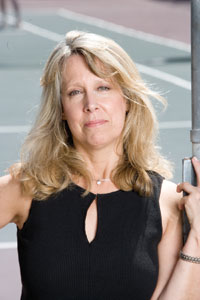 Photo by Brian Davis
Photo by Brian DavisRonni Fisher credits her father for instilling her with a love of athletics. A self-described “tomboy” as a kid, she grew up in Valley Stream, New York, “playing every sport that used a ball. In softball I had to be either the pitcher or first base,” she jokes, “because I was determined to be in on every play.”
She was equally determined to work in television sports production, which in the mid-1980s was pretty much a male bastion. That didn’t stop Fisher. “I took any job I could to get my foot in the door,” she says.
She began as a secretary at CBS Records in New York and soon worked her way into the finance department of the sports division. That led to a job as a production secretary, working with DGA member Chuck Will who, at that time, was associate producer of CBS golf and tennis.
Soon after she was hired, a wave of layoffs hit the network. A few weeks later, however, she was back in the newly created post of program assistant, again working closely with Will, who became a mentor. “I learned so much from him,” she declares. “We should all aspire to be just like Chuck Will.”
She went on the road, working all the network’s golf and tennis tournaments. She remembers picking up pointers from just watching legendary CBS stage manager Jimmy Wall during the US [tennis] Open. It wasn’t long before she got her shot at stage-managing, as well as assistant directing.
Fisher has had her share of mishaps stage managing sports. “Things can definitely go wrong,” she says, recalling a hockey game at the Great Western Forum in Los Angeles where part of her job was to flash the promo cards for the announcer. “There is no booth at the Forum. Instead, the announcers sit in the stands. I had all my promo cards ready to go and somehow, without realizing it, knocked them over straight down between the stands. It’s time to flash a promo card and I can’t find any of them!”
In 1986, Fisher relocated to Los Angeles, partially because she was tired of East Coast winters but also because of the industry-wide resistance to women working in sports production. Nowadays, she concentrates more on films but still freelances for sports programming, usually as a stage manager. Asked to describe a “good day,” Fisher doesn’t hesitate. “A good day to me means you are working with nice people and everything goes right.”